In this article:
Beetroots are deeply pigmented tubers that grow during winter and can be enjoyed both raw and cooked. (1) Not only are they easy on the taste buds, but beets are great for your overall health.
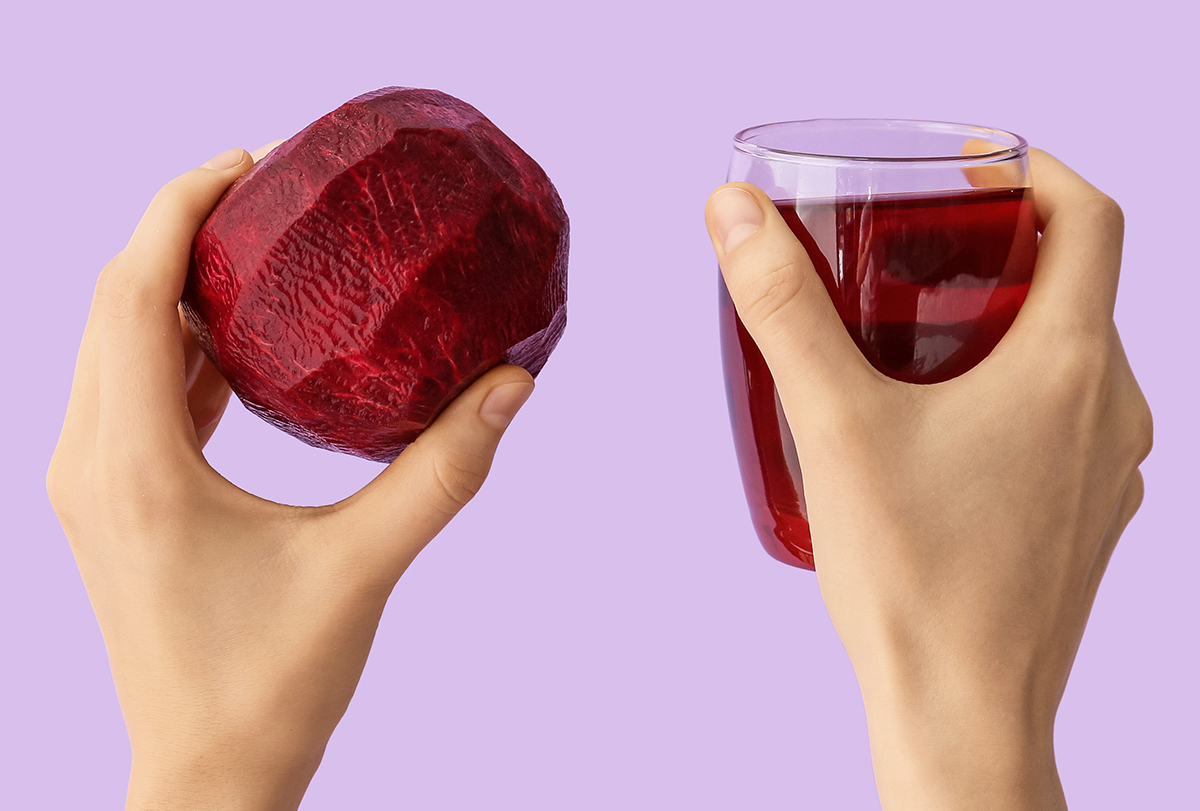
Beetroots also contain a wide range of nutrients that help improve your hair health in different ways. This article will focus on the hair benefits attributed to beetroots and how you can make the most of them.
Benefits of Beetroot for Hair
Beetroot is good for your hair in the following ways:
1. Improves blood count
Consuming beetroot helps improve your hemoglobin by increasing your red blood count. This effect is mainly due to its content of iron, folic acid, and potassium, which are used by the body to manufacture new blood.
As a result, the volume of blood flowing to the scalp (along with the rest of the body) increases, delivering more nutrients and oxygen to the hair follicles. Better nourished hair follicles will inadvertently produce better hair.
2. Aids blood purification
Beetroot intake is known to improve lymphatic flow throughout the body. Lymph fluid collects toxins and flushes them out of the body, and beets help stimulate lymph drainage.
Thus, this nutritious vegetable helps cleanse your blood as well as various organs such as the kidneys, liver, gut, and stomach. (2) This detoxifying effect has a positive impact on your general health, including your hair quality.
3. Nourishes the hair follicles for better hair quality and growth
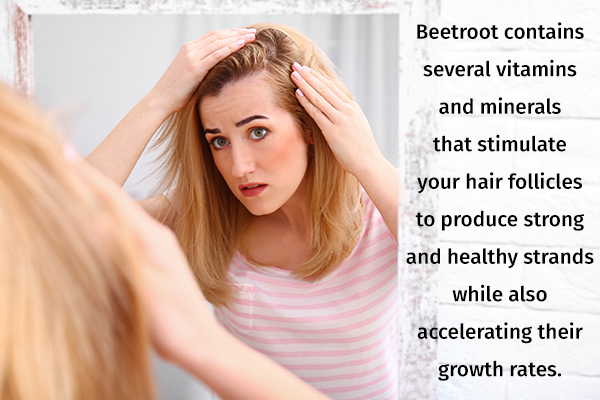
Beetroot contains several nutrients that are essential for hair health and hair growth, such as potassium, iron, folate, vitamins A and C, proteins, magnesium, and calcium. These vitamins and minerals stimulate your hair follicles to produce strong and healthy strands while also accelerating their growth rates.
The high vitamin C content of beets (3) is used by the body to make a structural protein called collagen. Collagen is a key component of the hair structure.
A deficiency of the aforementioned nutrients can hamper your hair quality as well as your hair growth. For example, not consuming enough potassium and iron can make your hair dull and weak. Lack of vitamin A, proteins, and calcium in the diet can also make your hair brittle and lifeless.
Plus, beets are full of carotenoids, potent antioxidants that are known to promote better blood circulation, (4) which leads to increased delivery of nutrients to the hair follicles.
4. Reduces and repairs hair damage
Beetroot is full of antioxidants that help counter the harmful activity of free radicals that damage healthy cells and tissue, including your hair follicles. (5)
Plus, it contains a lot of iron, potassium, and electrolytes, (6) all of which help repair dull and damaged hair to keep them from breaking or falling out.
5. Soothes scalp inflammation
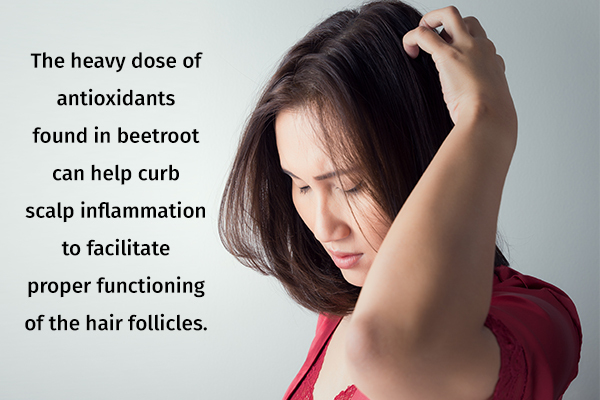
Free radicals damage healthy cells and trigger inflammation in the body. Antioxidants help scavenge and neutralize these free radicals to relieve the inflammation.
Scalp inflammation can impede the activity of hair follicles, resulting in stunted and poor hair growth. However, the heavy dose of antioxidants found in beetroot can help curb this kind of scalp inflammation to facilitate the proper functioning of the hair follicles.
Beetroot is also replete with manganese, which is used by the body for making a highly potent antioxidant that is great at fighting this kind of inflammation.
6. Works as a natural hair dye
Beetroot gets its color from a group of potent antioxidants known as betalains, which contain a deep burgundy-red pigment called betacyanin. (7) These antioxidants curb the damaging activity of free radicals to protect your hair against the oxidative stress they cause. (8)
But the betacyanin pigment is also used as a coloring agent in various cosmetics and drugs. When applied to blonde or light-brown hair, this natural pigment transfers a reddish or purplish tinge to your tresses.
Meanwhile, darker hair tends to acquire a more purplish hue that is mostly visible in the sun. Unlike chemical hair dyes, beetroot helps transform the look of your hair without the damage. (9)
How to Dye Your Hair With Beetroot
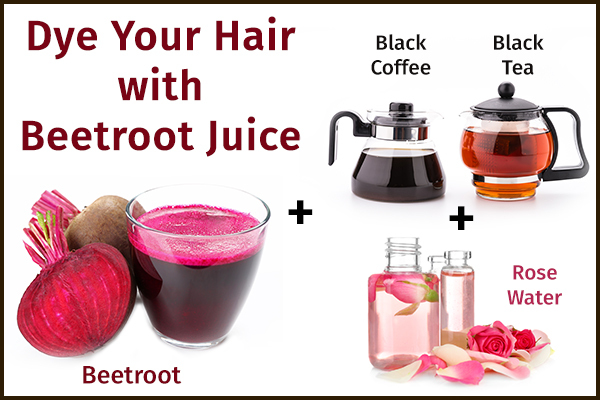
Method 1:
- Pour 1 cup of beetroot juice, ½ cup of black tea or coffee, and 1 tbsp of rosewater into a bowl and mix them well.
- Apply this mixture to your hair.
- Leave it in for 1 hour, and then wash it off with plain water.
Method 2:
- Extract the juice from 2–3 beets.
- Mix the beetroot juice with 4 tbsp of carrier oil such as coconut or olive oil.
- Generously apply this solution to your hair.
- Cover your hair with a plastic head wrap to avoid dripping.
- Let it sit for at least 1 hour.
- Rinse it off with plain water.
This natural hair dye will leave your hair with a reddish tint that may last for a few weeks.
How to Consume Beetroot for Hair Health
If you don’t want to apply beets directly to your hair and scalp, you can derive their hair benefits by eating them as part of a well-balanced, nutritious diet. Here are some easy but tasty ways to add beetroot to your meals:
- Grated beets can be added to your regular salads or coleslaw.
- Blend the beetroots to make a paste and mix it with Greek yogurt for a nutritious dip.
- Drink 200 ml of freshly extracted beetroot juice daily for maximum hair benefits. It is important that you consume it fresh since the juice starts losing its nutritional value when stored. Packaged beetroot juice usually contains lesser nutrients along with added sugars that are bad for your overall health.
- You can also cook and consume beet leaves in the same way as spinach.
Precautions When Using Beetroot on Hair
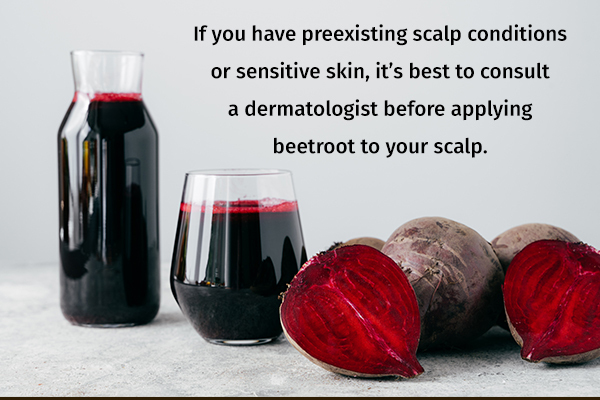
- Using beetroot topically for dyeing your hair is completely safe with little to no reported side effects. However, it is always recommended that you conduct a patch test before applying it to your scalp to rule out any allergies or adverse reactions.
- If you have preexisting scalp conditions or sensitive skin, it’s best to consult a dermatologist before applying beetroot to your scalp.
- Beetroot intake may prove harmful to people with diabetes or kidney/gallbladder stones.
Final Word
Beetroots are packed with multiple vitamins, minerals, and antioxidants that help protect, repair, and nourish your hair.
But for them to yield these benefits, you must consume them as part of an overall wholesome diet. No food on its own can solve your hair problems, and the same goes for beets.
Plus, you can use them topically to give your hair a nice shade of red or purple. They offer a safer and cheaper alternative to chemical hair dyes that damage and dry out your tresses.
- Was this article helpful?
- YES, THANKS!NOT REALLY


